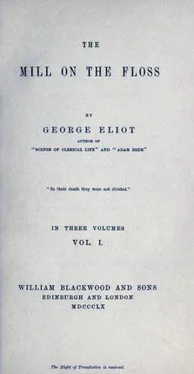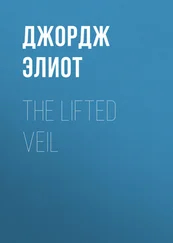"Well, well, we won't send him out o' reach o' the carrier's cart, if other things fit in," said Mr. Tulliver. "But you mustn't put a spoke i' the wheel about the washin,' if we can't get a school near enough. That's the fault I have to find wi' you, Bessy; if you see a stick i' the road, you're allays thinkin' you can't step over it. You'd want me not to hire a good wagoner, 'cause he'd got a mole on his face."
"Dear heart!" said Mrs. Tulliver, in mild surprise, "when did I iver make objections to a man because he'd got a mole on his face? I'm sure I'm rether fond o' the moles; for my brother, as is dead an' gone, had a mole on his brow. But I can't remember your iver offering to hire a wagoner with a mole, Mr. Tulliver. There was John Gibbs hadn't a mole on his face no more nor you have, an' I was all for having you hire him ; an' so you did hire him, an' if he hadn't died o' th' inflammation, as we paid Dr. Turnbull for attending him, he'd very like ha' been drivin' the wagon now. He might have a mole somewhere out o' sight, but how was I to know that, Mr. Tulliver?"
"No, no, Bessy; I didn't mean justly the mole; I meant it to stand for summat else; but niver mind — it's puzzling work, talking is. What I'm thinking on, is how to find the right sort o' school to send Tom to, for I might be ta'en in again, as I've been wi' th' academy. I'll have nothing to do wi' a 'cademy again: whativer school I send Tom to, it sha'n't be a 'cademy; it shall be a place where the lads spend their time i' summat else besides blacking the family's shoes, and getting up the potatoes. It's an uncommon puzzling thing to know what school to pick."
Mr. Tulliver paused a minute or two, and dived with both hands into his breeches pockets as if he hoped to find some suggestion there. Apparently he was not disappointed, for he presently said, "I know what I'll do: I'll talk it over wi' Riley; he's coming to-morrow, t' arbitrate about the dam."
"Well, Mr. Tulliver, I've put the sheets out for the best bed, and Kezia's got 'em hanging at the fire. They aren't the best sheets, but they're good enough for anybody to sleep in, be he who he will; for as for them best Holland sheets, I should repent buying 'em, only they'll do to lay us out in. An' if you was to die to-morrow, Mr. Tulliver, they're mangled beautiful, an' all ready, an' smell o' lavender as it 'ud be a pleasure to lay 'em out; an' they lie at the left-hand corner o' the big oak linen-chest at the back: not as I should trust anybody to look 'em out but myself."
As Mrs. Tulliver uttered the last sentence, she drew a bright bunch of keys from her pocket, and singled out one, rubbing her thumb and finger up and down it with a placid smile while she looked at the clear fire. If Mr. Tulliver had been a susceptible man in his conjugal relation, he might have supposed that she drew out the key to aid her imagination in anticipating the moment when he would be in a state to justify the production of the best Holland sheets. Happily he was not so; he was only susceptible in respect of his right to water-power; moreover, he had the marital habit of not listening very closely, and since his mention of Mr. Riley, had been apparently occupied in a tactile examination of his woollen stockings.
"I think I've hit it, Bessy," was his first remark after a short silence. "Riley's as likely a man as any to know o' some school; he's had schooling himself, an' goes about to all sorts o' places, arbitratin' and vallyin' and that. And we shall have time to talk it over to-morrow night when the business is done. I want Tom to be such a sort o' man as Riley, you know, — as can talk pretty nigh as well as if it was all wrote out for him, and knows a good lot o' words as don't mean much, so as you can't lay hold of 'em i' law; and a good solid knowledge o' business too."
"Well," said Mrs. Tulliver, "so far as talking proper, and knowing everything, and walking with a bend in his back, and setting his hair up, I shouldn't mind the lad being brought up to that. But them fine-talking men from the big towns mostly wear the false shirt-fronts; they wear a frill till it's all a mess, and then hide it with a bib; I know Riley does. And then, if Tom's to go and live at Mudport, like Riley, he'll have a house with a kitchen hardly big enough to turn in, an' niver get a fresh egg for his breakfast, an' sleep up three pair o' stairs, — or four, for what I know, — and be burnt to death before he can get down."
"No, no," said Mr. Tulliver, "I've no thoughts of his going to Mudport: I mean him to set up his office at St. Ogg's, close by us, an' live at home. But," continued Mr. Tulliver after a pause, "what I'm a bit afraid on is, as Tom hasn't got the right sort o' brains for a smart fellow. I doubt he's a bit slowish. He takes after your family, Bessy."
"Yes, that he does," said Mrs. Tulliver, accepting the last proposition entirely on its own merits; "he's wonderful for liking a deal o' salt in his broth. That was my brother's way, and my father's before him."
"It seems a bit a pity, though," said Mr. Tulliver, "as the lad should take after the mother's side instead o' the little wench. That's the worst on't wi' crossing o' breeds: you can never justly calkilate what'll come on't. The little un takes after my side, now: she's twice as 'cute as Tom. Too 'cute for a woman, I'm afraid," continued Mr. Tulliver, turning his head dubiously first on one side and then on the other. "It's no mischief much while she's a little un; but an over-'cute woman's no better nor a long-tailed sheep, — she'll fetch none the bigger price for that."
"Yes, it is a mischief while she's a little un, Mr. Tulliver, for it runs to naughtiness. How to keep her in a clean pinafore two hours together passes my cunning. An' now you put me i' mind," continued Mrs. Tulliver, rising and going to the window, "I don't know where she is now, an' it's pretty nigh tea-time. Ah, I thought so, — wanderin' up an' down by the water, like a wild thing: She'll tumble in some day."
Mrs. Tulliver rapped the window sharply, beckoned, and shook her head, — a process which she repeated more than once before she returned to her chair.
"You talk o' 'cuteness, Mr. Tulliver," she observed as she sat down, "but I'm sure the child's half an idiot i' some things; for if I send her upstairs to fetch anything, she forgets what she's gone for, an' perhaps 'ull sit down on the floor i' the sunshine an' plait her hair an' sing to herself like a Bedlam creatur', all the while I'm waiting for her downstairs. That niver run i' my family, thank God! no more nor a brown skin as makes her look like a mulatter. I don't like to fly i' the face o' Providence, but it seems hard as I should have but one gell, an' her so comical."
"Pooh, nonsense!" said Mr. Tulliver; "she's a straight, black-eyed wench as anybody need wish to see. I don't know i' what she's behind other folks's children; and she can read almost as well as the parson."
"But her hair won't curl all I can do with it, and she's so franzy about having it put i' paper, and I've such work as never was to make her stand and have it pinched with th' irons."
"Cut it off — cut it off short," said the father, rashly.
"How can you talk so, Mr. Tulliver? She's too big a gell — gone nine, and tall of her age — to have her hair cut short; an' there's her cousin Lucy's got a row o' curls round her head, an' not a hair out o' place. It seems hard as my sister Deane should have that pretty child; I'm sure Lucy takes more after me nor my own child does. Maggie, Maggie," continued the mother, in a tone of half-coaxing fretfulness, as this small mistake of nature entered the room, "where's the use o' my telling you to keep away from the water? You'll tumble in and be drownded some day, an' then you'll be sorry you didn't do as mother told you."
Читать дальше












